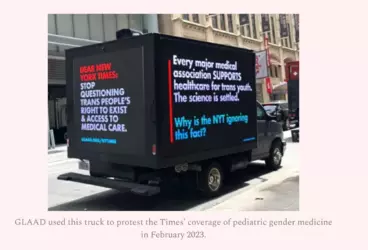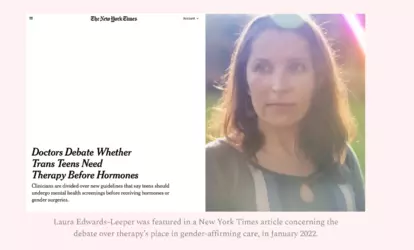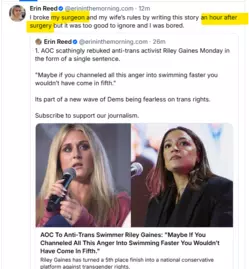BENJAMIN RYAN
NOV 04, 2025
 https://substackcdn.com/image/fetch...56-da69-439f-91bd-615b9f32a4ed_1814x1260.heic
https://substackcdn.com/image/fetch...56-da69-439f-91bd-615b9f32a4ed_1814x1260.heic
This article on Erin Reed’s Substack, written by her staffer, S. Baum, caused an immediate consequence to Washington State University’s office that oversees continuing medical education accreditation.
I have a new
article out today in The New York Sun concerning the fallout from a piece that the transgender activist-journalist
Erin Reed
published on her Substack on Wednesday. In an article written by Ms. Reed’s staffer, her fellow
activist-journalist S. Baum, the
popular Substack account lambasted Washington State University (WSU) for accrediting a continuing medical education (CME) course on behalf of the
Society for Evidence Based Gender Medicine (SEGM).
As Baum eagerly pointed out, SEGM, which is a scientific collective devoted to scrutinizing the evidence base behind pediatric gender medicine, has
been branded an anti-trans hate group by the Southern Poverty Law Center. SEGM is the bête noire of many trans activists for instilling scientific skepticism among thought leaders regarding the safety and efficacy of treating gender-related distress among minors with
puberty blockers,
cross-sex hormones and
gender-transition surgeries.
Immediately after the article ran on Ms. Reed’s Substack, the governing body that oversees CME accreditation forced WSU to suspend SEGM’s
suite of CME courses, pending an investigation, I reported for the Sun. This was an extraordinary move on the part of the Accreditation Council for Continuing Medical Education (
ACCME), given that there is no apparent policy granting the organization authority to preemptively suspend courses
before the completion of an investigation.
I encourage you to read both
Baum’s Substack article for Ms. Reed and my
New York Sun article to get all the details.
 https://substackcdn.com/image/fetch...34-6b8f-4752-9e52-7ac2ac29089e_1444x1388.heic
https://substackcdn.com/image/fetch...34-6b8f-4752-9e52-7ac2ac29089e_1444x1388.heic
My New York Sun article
In this two-part Substack of my own, I want to look closely at Baum’s reporting on the WSU-SEGM connection. The article hinges on the validity of the SPLC’s hate-group label—a designation that is much more tenuous than Baum and Ms. Reed would have their readers believe.
In short, the SPLC’s “hate map” is not gospel.
Otherwise, Baum’s article contained sweeping accusations against SEGM that were unsupported by specific details or citations, misrepresentations of the facts, and some outright errors. This advocacy-driven journalistic heedlessness is in keeping with Ms. Reed’s long history of distortions and erroneous reporting where pediatric gender medicine in particular is concerned. Most notably, she proved herself a
font of falsehoods about
Britain’s Cass Review when the weighty and instantly controversial report about this medical field was published last year. And when challenged and thoroughly fact checked, Ms. Reed only doubled down.

Activist-Blogger Erin Reed Can't Stop Telling Falsehoods About Gender Medicine
BENJAMIN RYAN
·
APRIL 23, 2024
Read full story

The Cass Review Fact Check: It's Clear That Many People Never Bothered to Read The Report
BENJAMIN RYAN
·
APRIL 17, 2024
Read full story
Despite such questionable reporting practices, Ms. Reed has become wildly successful over the past few years. She has amassed some 127,000 Substack subscribers; is number 22 in the ranking of paid subscriptions among the politics Substacks, not far behind
Adam Kinzinger
(20),
Andrew Sullivan
(19),
Matthew Yglesias
(15) and
Dan Rather
(14); and likely pulls in a very healthy six-figure revenue stream—enough money, if nothing else, to hire Baum as a staffer.
https://substackcdn.com/image/fetch...84-e2e2-4340-ad15-4e89c54b829f_1996x1200.heic
Erin Reed
Ms. Reed is also a case study of two critical problems facing the media landscape in the era of declining legacy media and a surge of reader interest in independent newsletters:
1) A lack of accountability when Substack authors publish faulty reporting but answer to no one but their subscribers
2) Audience capture, when authors tell their subscribers what they want to hear to keep them subscribing and, ideally, paying for content.
Each of these problems fuels the other when, in particular, readers are not discerning or knowledgeable enough about a subject to recognize when they are being misled and are unwittingly being provided a buffet of confirmation bias to suit their priors. I’m not suggesting that this phenomenon is limited only to the daft and the reading-comprehension challenged. Pediatric gender medicine in particular is a wildly complex and contradictory topic that confounds readers and reporters alike. Given how politicized the issue is, this leads even well-meaning, ostensibly cautious and circumspect journalists to publish what philosopher
Dan Williams
dubbed in an enlightening recent Substack article “
highbrow misinformation.”
It can be very hard for anyone, reader or writer, to separate fact from fiction in a field as contentious as pediatric gender medicine. I spent a year studying it obsessively before I published my first article on the topic.
 https://substackcdn.com/image/fetch...def-b589-4e91-b31a-f36d56a65e84_900x1336.heic
https://substackcdn.com/image/fetch...def-b589-4e91-b31a-f36d56a65e84_900x1336.heic
It takes a lot of reading to wrap your mind around this subject.
Despite positioning herself as a bulwark against misinformation about trans issues, Ms. Reed is often a
source of misinformation on the topic. You see this same ironic pattern play out with the debunking podcaster Michael Hobbes, who is what my mother used to call “often wrong but never in doubt” and who
Jesse Singal
has excoriated as “
Spectacularly Wrong About Youth Gender Medicine.”
Let’s move closer to Baum’s article for Ms. Reed on the SEGM-WSU imbroglio. First, some background about SEGM.
Hazard Ratio: Benjamin Ryan is a reader-supported publication. To receive new posts and support my work, consider becoming a free or paid subscriber. Note that it’s cheaper to subscribe via the web. If you do so via the Substack app, Apple charges a fee.
Subscribe
What is SEGM?
The crux of Baum’s article is the incontrovertible fact that the SPLC branded SEGM a hate group in 2024, which puts SEGM in the ignominious and ominous company of the KKK. This makes WSU’s vetting of SEGM’s courses, the article argues, nothing short of appalling. No university should remain in good standing if it lends its credibility to such a bigoted organization, the article suggests.
SEGM’s CME course is comprised of
seven videos, which run for several hours all told. They include lectures and panel discussions from SEGM’s inaugural conference in New York City in October 2023. I attended the conference, which spanned two and a half days, along with perhaps 75 other people. So I was in the room when all the videos were shot.
To hear the common characterizations of SEGM from Ms. Reed and other trans activists, you would think this confab was a tent revival of seething anti-trans hate. On the contrary, the conference was a geeked-out crash course in evidence-based medicine principles. It featured a collective of researchers who hold posts at universities across the Western world and who presented the type of polished scientific presentations I have seen at many other medical conferences. (More on the specifics of the conference are to come in Part 2 of this Substack.) This included
initial data from the only study ever to assess whether cross-sex hormone treatment is tied to a difference in the suicide death rate among youth attending gender clinics (it was not).

Youth Gender-Transition Treatment Not Tied to Lower Suicide Deaths in Finland
BENJAMIN RYAN
·
OCTOBER 13, 2023
Read full story
What distinguished this conference, however, was that almost all the presenters could be considered, at the very least, skeptics of pediatric gender medicine. By and large, these people are focused on two chief concerns: 1) The risks of prescribing minors with puberty blockers and cross-sex hormones are considerable; and 2) This demands a stronger quality of data backing the treatment’s efficacy than researchers have produced to date. The result is a risk-benefit calculus that, at least in many cases, renders providing treatment unethical, given how minors are unable to consent to shouldering those long-term risks.
Some of the presenters at SEGM’s conference seemed open to the possibility that future research could ultimately provide a sufficient quality of evidence to make it ethical to provide these medical interventions to at least some, if not many, youth with gender dysphoria. Others at the conference appeared to be hard-liners who could not see how treatment with such extreme potential negative outcomes, including infertility and sexual dysfunction, could ever be ethical to provide in pediatrics. That did not mean that the hard-liners all opposed
adult transition as well. And for what it’s worth, Erica Anderson, a transgender woman, psychologist and former head of the U.S. branch of the medical-activist organization the World Professional Association for Transgender Health (
WPATH) was among the presenters and is featured in SEGM’s CME course.
As I wrote in The New York Sun, Jesse Singal has previously weighed in on the character of the conference, in an interview he conducted with
Dr. Gordon Guyatt, the evidence-based medicine expert from McMaster University in Ontario whose lab conducted systematic reviews of pediatric gender medicine for SEGM but who has since
broken ties with the organization and denounced it as anti-trans.
I wrote:
In the
transcript of an interview Mr. Singal recently conducted with Gordon Guyatt regarding the academic’s break from SEGM, Singal referenced the organization’s conference, where Dr. Guyatt
had presented about evidence-based medicine. Mr. Singal argued that “it was a science conference like any other.”
Mr. Singal pressed Dr. Guyatt for evidence of SEGM harboring anti-trans animus, including what the professor suggested was a bedrock support on SEGM’s part for bans of pediatric gender medicine. Dr. Guyatt said he had emails that would back his claims. He later provided a tranche of emails he’d exchanged with SEGM, but Mr. Singal reported he could find no smoking gun within them.
At the 2023 SEGM conference, there was little in the form of politics and an almost complete absence of any suggestion of animus toward transgender people, save perhaps a couple of questions from a small coterie of sharp-tongued attendees. I did notice that SEGM cofounder Dr. William Malone, an endocrinologist from Idaho, seemed to be more of hard-liner who could not see how giving these treatments to gender-distressed kids could be ethical.
At one point Dr. Malone said: “I don’t understand how these interventions are being offered so indiscriminately in the United States currently. I’m heartened to see the rollback in Europe. That seems to be the logical conclusion when you have uncertainty of evidence and certainty of harm.”
Notice, however, how Dr. Malone characterized this in evidence-based framing, as opposed to a political framing or one based on animus toward or erasure of transgender identities.
Perhaps critics could assert that all this talk of evidence-based-medicine principles is just a pretext, a cover for such animus on the part of Dr. Malone and others affiliated with SEGM. I do think it’s at least possible that for SEGM’s leadership, no amount of evidence would ever be enough to satisfy them that providing puberty blockers and cross-sex hormones to certain minors with gender dysphoria would represent a favorable balance of risks vs. benefits. It’s possible that SEGM, facing improved scientific evidence backing such treatment, would only continue moving the evidentiary goalposts. But this is just conjecture on my part at this point.
What I have seen in my lengthy dealings with the SEGM crowd over a nearly three-year period is a wonky collective of people who obsess over the minutiae of scientific data and who collectively express concern about the well-being of youth who harbor distress about their gender.
At the core of this fractious debate is the crucial question of how best to care for a substantial population of children and adolescents who harbor distress about their gender and who have a very high rate among them of other psychiatric problems, including depression, anxiety, suicidality and self harm, as well as autism. There are very sharp disagreements over the best course of action for any one of these young people. And given how politicized the issue has become, it can be extremely difficult to make sense of the motivations of those who seek to guide the debate.
So what was the motivation of the Southern Poverty Law Center to brand SEGM a hate group?
Share
SPLC’s hate-group designation
https://substackcdn.com/image/fetch...80c-1ebd-4b8c-b77a-37df2eeba66d_1200x675.heic
The Southern Poverty Law Center added SEGM to its list of hate groups
in June 2024.
As Baum wrote in the article for Ms. Reed, referring to the implications of WSU accrediting SEGM’s CME course:
Critics argue the move by WSU gives the appearance of legitimacy to a group with opaque funding and a disturbing proximity to far-right, Christian fundamentalist forces. It also means well-meaning providers who want to enhance their practice with trans-competent care may be misdirected to SEGM propaganda instead of evidence-based best practices. Most damning, critics say, is that listing SEGM as a CME option lends undue legitimacy to a dangerous cell of
what the Southern Poverty Law Center has dubbed an anti-trans pseudoscience network.
This begs the question of whether people should take SPLC’s hate-group designation on faith, as Ms. Reed has always been
eager to do. What is the basis of SPLC’s decision to apply this label to this group of science geeks and what is the very validity of the label itself?
In a
2019 lawsuit in the U.S. District Court for the District of Columbia, a federal judge dismissed a complaint the Center for Immigration Studies filed against the SPLC for branding the organization a hate group, because the judge found the hate-group designation was a matter of opinion rather than fact. The judge concluded that the process by which the SPLC made this designation “is an entirely subjective inquiry,” and that SPLC’s statements branding the organization a hate group “do not depend upon objective data or evidence.” The subjective nature of the designation, the judge ruled, meant it couldn’t support a charge of racketeering wire fraud.
In a
case that same year in the U.S. District Court for the Middle District of Alabama, Coral Ridge Ministries Media sued the SPLC and Amazon after the ministries’ application to AmazonSmile was rejected due to the SPLC’s having branded them a hate group. The court dismissed the complaint because it found the “hate group” label to be a matter of opinion rather than a provable fact, and thus unsuitable as the basis for defamation or false-advertising claims. The 11th Circuit later affirmed the dismissal.
A conflict of interest
The SPLC was not a neutral arbiter of SEGM’s position on transgender youth, because SPLC was representing
plaintiffs in the lawsuit,
Boe v. Marshall, against Alabama’s ban of gender-transition treatments for minors. SPLC attorneys, along with those representing Human Rights Campaign Foundation and others, filed that lawsuit in April 2022.
The SPLC based its designation of SEGM as a hate group at least in part on a sprawling, six-part report, called
CAPTAIN, that the SPLC commissioned and then published in December 2023. The
Boe v. Marshall case was still pending trial in the Middle District of Alabama at that point. Much of the case wound up hinging upon the credibility of WPATH as the author of the widely referenced 2022 trans-care guidelines. This put SPLC attorneys in the position of simultaneously defending WPATH’s reputation while the organization had savaged one of WPATH’s most potent critics, SEGM, in the CAPTAIN report.
What’s more, in records that the Alabama attorney general Steve Marshall subpoenaed in his defense against this
lawsuit and that were
unsealed only weeks after the SPLC branded SEGM a hate group, an author of WPATH’s treatment guidelines was revealed expressing “concerns, echoed by the social justice lawyers we spoke with…that evidence-based review reveals little or no evidence” backing gender-transition treatment for minors “and puts us in an untenable position in terms of affecting policy or winning lawsuits.”
SEGM would indeed reveal such weakness of the evidence. SPLC was in a position, however, to undermine SEGM’s credibility.
Remarkably, the
initial publication of the CAPTAIN report was littered with typos, including many spelling errors, that remained uncorrected for at least a week after it was posted online.
https://substackcdn.com/image/fetch...50-8304-4a5e-856c-4d86e4f8dd6b_1568x1076.heic
The cover page for the CAPTAIN report on the SPLC web site
The report argued that SEGM is part of a vast “pseudoscience network” of overlapping and interconnected groups that share a common opposition to transgender rights.
Most centrally, the report asserted that SEGM cynically weaponizes doubt about the science backing gender-transition treatment for minors as a cover for its true motive of promoting outright bans of such interventions. The report makes references to notable instances in recent history of this brand of crafty manipulation of science, including figures with a financial interest in tobacco or oil manufacturing doubt about cigarettes causing cancer or the burning of fossil fuels causing global warming. (See the book
Merchants of Doubt: How a Handful of Scientists Obscured the Truth on Issues from Tobacco Smoke to Climate Change for a great history of that sort of manipulation of science.)
The problem with this claim about SEGM in particular is it predicated on the notion that there is no substantive reason for significant doubt about pediatric gender medicine and that the vast majority of reasonable researchers and physicians support liberal access to these medical interventions for minors. It presumes that the LGBTQ media “watchdog” GLAAD was justified in saddling a light-up truck alongside The New York Times’ building in 2023 that claimed that the “science is settled” on the matter—a ridiculous claim to make about the science pertaining to just about anything.
 https://substackcdn.com/image/fetch...0c4a-e347-4021-b335-74defb94be61_484x380.heic
https://substackcdn.com/image/fetch...0c4a-e347-4021-b335-74defb94be61_484x380.heic
GLAAD used this truck to protest the Times’ coverage of pediatric gender medicine in February 2023.
The CAPTAIN report points to an apparent consensus supporting these medical practices by the nation’s top medical organizations. Indeed, the vast majority of such societies have thrown their weight behind pediatric gender medicine. (
Not a plastic surgeons’ society, however.) But the SPLC report does not acknowledge that the health authorities in a slew of Northern European nations have sharply restricted minors’ access to gender-transition treatments and surgeries in recent years. So there is clear disagreement about this field internationally if nothing else.
The report also fails to assess how the U.S. medical societies came to support these medical practices in the first place. The foundational
2018 policy paper backing the so-called gender-affirmative method of caring for children with gender dysphoria by the American Academy of Pediatrics, for example, was written by a single person who at the time was still a medical resident. It was then edited by a small committee. But it was never voted upon by the AAP’s tens of thousands of members. And efforts by AAP dissidents, most notably founding SEGM board member Dr. Julia Mason, an Oregon pediatrician, to push a vote on the matter were met with aggressive parliamentary thwarting by AAP leadership. The AAP has also gone to considerable lengths to ensure that significant dissent toward youth gender medicine is not voiced at its annual conference,
as I reported last year.
The CAPTAIN report is heavy on innuendo and guilt-by-association accusations of SEGM’s faults but light on the details of what exactly the organization has said or done that counts as acts of pseudoscience peddling. But the report does find specific fault in SEGM’s intellectual support for the theoretical phenomenon known as rapid-onset gender dysphoria (ROGD), as well as the nonprofit’s backing of psychotherapy as a first-line treatment for pediatric gender dysphoria.
Baum addressed these two issues in the article for Ms. Reed’s Substack by citing a WSU academic’s expressions of concern about the university lending credibility to SEGM.
In the first iteration of Baum’s article, the journalist incorrectly stated the name and discipline of this academic, referring to “Dr. L.A. Miller, a sociologist at WSU.” Later, the article changed the text to correctly cite this individual (who uses they/them pronouns), calling them: “Dr. M.A. Miller, an assistant professor of gender, race, and health at WSU.” Ms. Reed did not run an editor’s note to acknowledge the correction.
I emailed
Dr. Miller, who is an assistant professor of English, seeking comment, but the academic did not reply.
Dr. Miller acknowledged in their conversation with Baum the importance of honoring academic freedom, in particular amid a climate in which the Trump administration has attacked universities from all fronts. However, Miller argued that SEGM’s positions were beyond the pale.
Baum wrote:
Miller felt lending WSU’s official accrediting capacity to platform proponents of debunked ideas—like “Rapid Onset Gender Dysphoria,”
a quack theory painting transness as a social contagion, or “
exploratory therapy,” which has been called
rebranded conversion therapy—goes beyond the spirit of diverse thought and debate.
“It’s another thing entirely to suggest that medical providers can be credentialed in something that has already been unanimously understood as not only pseudoscientific, but also deeply, deeply dangerous to already vulnerable populations,” Miller said.
Since health researcher Dr. Lisa Littman first coined the term ROGD in a
2018 paper, the concept has been attacked from all sides. But it is most certainly not debunked. (Debunking
any theory, which requires eliminating any reasonable argument in its favor, is a very difficult task, mind you.) ROGD, in which youths suddenly develop gender dysphoria, in theory through social contagion, remains a hypothesis that seeks to help explain why the past 13 years or so has seen a surge of natal females in particular expressing gender dysphoria and a cross-sex identification after the onset of puberty.
As for any unanimity among experts in considering ROGD pseudoscientific, as Dr. Miller claimed was the case, Dr. Littman has the support, for one, of Northwestern psychology professor Michael Bailey. Along with Canadian psychologist Kenneth Zucker, they have
launched a long-term study of youths with gender dysphoria that could provide data to inform this hypothesis. There are certainly other academics who do not dismiss ROGD as pseudoscientific, but all one needs it one of them to disprove Dr. Miller’s claims of unanimous opprobrium.

Controversial Gender Researchers Launch Long-Term Study of Gender Dysphoric Youth and Their Parents
BENJAMIN RYAN
·
SEPTEMBER 16, 2024
Read full story
Regarding exploratory therapy: The term was popularized by a
2021 Washington Post oped by Laura Edwards-Leeper, a psychologist who helped establish the field of pediatric gender medicine in the United States and who coauthored the chapter on adolescents in WPATH’s 2022 treatment guidelines, and Erica Anderson, the transgender former head of WPATH’s U.S. division. The two psychologists expressed concern that the field of pediatric gender medicine was becoming too myopic and focused on gender-transition drugs as a solution for gender dysphoria. They called for a greater emphasis on exploration through psychotherapy with children harboring gender-related distress.
 https://substackcdn.com/image/fetch...d8-a00e-4ed3-a8a6-2e91cdfcde03_1742x1288.heic
https://substackcdn.com/image/fetch...d8-a00e-4ed3-a8a6-2e91cdfcde03_1742x1288.heic
Edwards-Leeper and Anderson’s WaPo oped caused quite a stir
Edwards-Leeper and Anderson would come to regret effectively fueling the wide purchase of the term “exploratory therapy.” They have told me that, for starters, they see the term as redundant, since all psychotherapy is by its nature exploratory. The term has otherwise been sullied by intellectuals such as
Florence Ashley, an
assistant professor of law at the University of Alberta, who
has argued that such therapy as tantamount to harmful so-called conversion therapy and that psychological gatekeeping surrounding gender-transition treatment, including for youth, is harmful and stigmatizing. Ms. Reed has
echoed this claim in her Substack.
The CAPTAIN report would have its readers believe that this debate over the place of therapy in caring for gender dysphoric youths is clear-cut and that only those with malign, anti-trans intent would suggest putting children through needless and harmful therapy when what they need is to go on puberty blockers. And yet this debate remains
lively and unresolved.
 https://substackcdn.com/image/fetch...a3-82b9-4c42-83b9-bda767f44abb_2426x1420.heic
https://substackcdn.com/image/fetch...a3-82b9-4c42-83b9-bda767f44abb_2426x1420.heic
Laura Edwards-Leeper was featured in a New York Times article concerning the debate over therapy’s place in gender-affirming care, in January 2022.
This debate is at the crux of a
case before the Supreme Court this term over state bans of conversion therapy practices for minors with respect to their gender identity or sexual orientation. The plaintiff in the case, a Colorado counselor, argues that, even with a carve-out for gender exploration in the state’s law banning conversion therapy, she would still be limited in the care she could provide to patients who struggle with their gender identity. Other mental-health professionals have expressed concern to me that such laws have a chilling effect on members of their profession who want to provide the best care in their power to youth with gender-related distress.
The CAPTAIN report also suggests that SEGM is somehow linked to definitively anti-LGBTQ groups through financial means. This is a dubious assertion.
As I wrote in the Sun:
The SPLC report
zeroed in on the fact that SEGM and various conservative anti-LGBTQ organizations all received funding through certain so-called donor advised funds. And yet SPLC
also receives funding—millions of dollars annually—through those very funds.
I highly recommend this article by the
Void if removed
Substack detailing the flaws in the CAPTAIN report’s arguments about SEGM’s finances:
Void if removed
Oh CAPTAIN, My CAPTAIN
In May 2024, The Southern Poverty Law Centre (SPLC) added the Society for Evidence Based Gender Medicine (SEGM) and Genspect to its list of hate groups…
Read more
a year ago · 79 likes · 9 comments · Void if removed
Also check out
this thorough and balanced article on SEGM by the science magazine UnDark.
That’s it for Part I of my fact check of the Erin Reed Substack about WSU’s accreditation of SEGM’s CME course. Stay tuned for Part II, in which I’ll go into greater detail about the article itself, and
subscribe if you don’t already.























